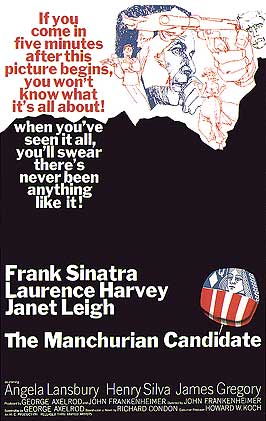
One of the great things about satire is it aims to go all the way in tearing apart its subject. There is no middle ground. Satires often present the strangest, most fascinating stories imaginable, because they pick up on something that affects us all and amplify it to the hilt. In The Manchurian Candidate, that something is paranoia -- specifically, the paranoia that permeated the Cold War.
The movie begins with the kidnapping of an American infantry patrol during the Korean War. Communists -- Chinese, Soviets and North Koreans -- falsify the memories of these infantrymen via hypnosis and provide a subconscious trigger in one, Sgt. Raymond Shaw (Laurence Harvey), that will force him to follow any order. Upon arrival back home, Shaw is honored as a war hero.
However, Capt. Bennett Marco (Frank Sinatra) is suspicious -- something about his memories just do not seem right with him. He works to unravel the mystery of what happened to his infantry in North Korea, while a McCarthyesque senator, John Yerkes Iselin (James Gregory), and his vicious, brutal wife, Mrs. Iselin (Angela Lansbury), who is also Shaw's mother, rise to power by exposing Communists in the American government.
Trust is something major in the movie. Marco cannot trust Shaw because he suspects something is wrong with Shaw; however, Marco also cannot trust himself because his memories have lied to him. Shaw, meanwhile, does not trust Iselin, his stepfather, because his hates him, or his mother, because he hates her too. And, eventually, Marco cannot trust his environment, because anything could be the visual trigger that makes Shaw susceptible to orders.
This leads to a palpable sense of paranoia -- you feel it almost every second you watch the movie. The Communist plot is so pervasive that it seems to have permeated every level of American government; Marco has nobody to turn to, because it appears as if everyone around Shaw is someone how involved in the conspiracy. Even those who are in league with each other are eventually suspicious of their comrades.
All the paranoia feeds a feeling of utter insanity throughout the movie, although the bizarre story born from satire has much to do with that insanity. The plot is somehow played completely straight -- which makes it even blacker and funnier -- while the strangest plot elements are introduced. One of these is the story of how Shaw meets and falls in love with Jocelyn Jordan (Leslie Parrish), the daughter of a liberal senator (John McGiver). The details are mind-boggling and nonsensical, and yet the feelings the two have for each other are real.
However, the nuttiest person in the movie has to be Eugenie Rose Cheney (Janet Leigh), who meets Marco on a train, falls in love with him and abandons her fiance to be with him after a surreal conversation between her and Marco. Some people -- I personally have no idea where I fall on this -- believe Cheney is actually Marco's "handler" (the person who gives the orders after the subconscious trigger is activated), and the conversation in a train is actually a complex series of codes. Either that, or she really is a complete nutter whose behavior conforms to no known human norms. (For what it is worth, the director, John Frankenheimer, and the screenwriter, George Axelrod, have admitted they don't know if Cheney is a sleeper agent; they lifted the conversation from the novel by Richard Condon, in which she is apparently not an agent of anyone in particular.)
A close second is easily Mrs. Iselin. She is a powerful, dominating woman who runs her husband's political career from behind the scenes. (Sen. Iselin is the kind of guy who decides on how many politicians he will accuse of being communists by reading ketchup bottles.) Lansbury is utterly ruthless in how she plays the role. Mrs. Iselin's ambition is absolute, and she does not let anyone or anything stand in her way. The only person she truly loves is her son, which is not apparent when the movie begins, but it will be disturbingly apparent once the movie comes to a close.
What adds to the craziness is the way the movie breezily weaves between the real and the surreal. During the scene where the Communists hypnotize the infantry, for example, the movie shifts back and forth between the point of view of the Communists, who see the room as the ordinary classroom it is, and the infantrymen, who are ordered to see the room as a tea party with old women. It is quite a sight to see nice old ladies speak about overthrowing capitalism, let me tell you.
All the insanity swirling around perfectly satirizes the feeling in the world during the Cold War -- two years before Dr. Strangelove (my favorite movie), I might add. What works the most about the movie is it cuts to a chilling truth: The bumblers, such as Sen. Iselin, are running the show, and as much as we might like to think we are in control of ourselves, we have less control than we believe.
And now a video! In this scene, Shaw receives a phone call that leads to his subconscious trigger being activated: